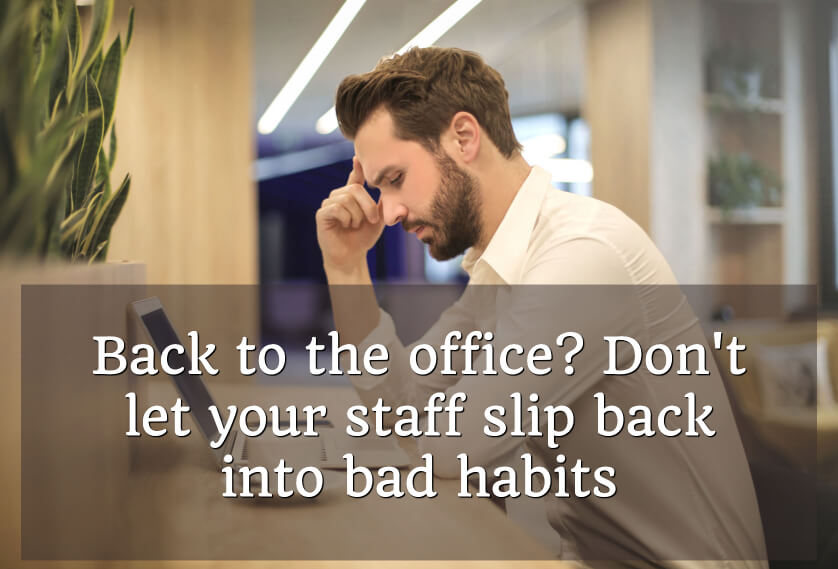Slowly, across the world, people are starting to drift back to their offices.
WFH is still a big thing - and will be for years (if not forever). But for many, office lights are being switched on again for the first time in ages.
Have you been working from your empty office during the lockdown? I've spoken to loads of my MSP clients who have, and they've loved the focus zone it's become for them.
A focus zone = somewhere you can work ON growing the business without interruption 😃
But now something curious is starting to happen... as some of their staff are coming back into the office (with all the appropriate protection), the focus zone is turning back into...
... the interruption zone.
An interruption zone = a place where you are trapped working IN the business on the small things that really don't matter, at the expense of your time, energy, family life and achieving your ambitions 😱
(Can you tell I really hate the interruption zone?)
In fact two of my MSP clients have told me today they've given up on their office to start working from home every day... because they couldn't bear the bad habits their returning employees immediately dropped back into.
So what are those bad habits?
- Interrupting the business owner for no real reason (they do it just because they're in front of them)
- Asking dumb questions, such as "we've got no milk, what should we do?"
- Asking the highest technical resource in the business for help with the lowest technical problems
- Generally not thinking for themselves
Does this sound familiar? 😡
The good news is, the lockdown has given you an opportunity to initiate real change. The bad news is, you only have a short window to do it.
Because if your team come back to the workplace and slip straight back into those bad habits, that's how they'll continue to be for years.
Instead, here's a 5 step process I recommend you follow
1) Discuss the benefits of focused working
Get everyone together on a Teams/Zoom call soon. And get them talking in a structured way about the downsides, then upsides about working from home.
This can be a great forum to go through your plans for WFH for them in the future.
I would then focus on their perceived benefits of working remotely, where they have talked about being able to focus and get more things done. Have a discussion about how disruptive the office can be much of the time.
This conversation leads nicely into "why?". What are the reasons that cause your team to interrupt each other (and by default, you)?
You might agree a list of the genuine reasons for good interruptions:
- Unhappy client
- Big tech problem that needs to be escalated quickly
- Someone's trousers are on fire
And another list of bad interruptions:
- An information request for something that's actually documented somewhere
- Asking if someone has looked at an item that's already in process somewhere, such as a Teams discussion, or worse "did you get my email?"
- A minor problem such as running out of milk
2) Agree and implement immediate changes
Then you'd agree how to eliminate the cause of these bad interruptions:
- Get 100% up to date on all client documentation, using IT Glue or some other system
- Agree criteria for when and how to escalate Teams discussions, emails etc
- Create a written system for each minor problem. Or better still, remove the problem altogether. Trust me, from bitter experience, if no-one buys milk and there's never any petty cash, just get the bloody milkman to deliver every day... the small cash cost is worth the benefit of lowering your blood pressure...
Make sure these changes are implemented quickly. Tackle it like you would a technical project. That means resourcing it properly, and making sure it doesn't become too bloated or drag on too long.
3) Answer questions with questions
When a member of your team hits you with a "bad interruption", whatever you do, don't give them the answer. Never, give them the answer.
Instead, ask questions, and stay silent till you get answers:
Dave: "Boss, we're out of milk, what should we do?"
You: "We discussed this as a team a few weeks ago. What did we agree?"
Dave: "Er... .er.... er..."
(You stay silent to force Dave to think)
Dave: "Something about... buying it...?"
You: "Correct. We agreed some specific instructions. Where would you find those?"
(Dave goes oddly silent and his face turns a funny colour. You worry he's having some kind of medical event. But then - he speaks)
Dave: "I remember! They're printed off on the fridge. I get the cash from Susan, and my reward for buying the milk is I can buy myself a chocolate bar up to 70p"
You: "Great work Dave"
Yes, this is PAINFUL. But when you answer questions with questions, you eventually teach your staff not to come to you with problems.
You'll need to teach this super power to your senior team too. Because when you stop answering questions, then they will become the default next port of call.
4) Use 121s to make the learning stick in the long-term
Log each bad interruption somewhere. So you know who needs reinforcement on systems and processes during their 121s.
If you're not doing monthly 121s with your team, you really should start. This article tells you why. And gives you a structure for a successful 121.
5) Find a new personal hidey hole
As much as steps 1 to 4 will help, nothing beats having somewhere to hide. Your own office within your office is cool. But a place where no-one can ever find you is even better.
When Starbucks and hotels are properly open again, you can hide there. Or get a tiny serviced office somewhere. All you need is a desk and a chair. You can tether off your mobile. That keeps costs down.
And right now, with lots of businesses looking to downgrade or even ditch their offices altogether, I imagine serviced office owners are very open to deals...






